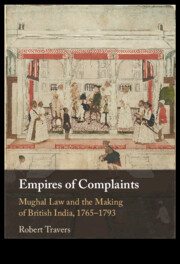Book contents
- Empires of Complaints
- Empires of Complaints
- Copyright page
- Dedication
- Contents
- Figures and Map
- Acknowledgements
- Note on Transliteration and Names
- Abbreviations
- Maps
- Introduction
- 1 Petitioning, Taxation, and Law in Eighteenth-Century Bengal
- 2 Recasting Mughal Law
- 3 Zamindari Succession Disputes and Persianate Hindu Law
- 4 ‘At the Durbar’ in Calcutta
- 5 A Jagirdar’s Lament
- 6 Conclusion
- Select Bibliography
- Index
6 - Conclusion
The Making and Remaking of a Colonial Judicial State (c.1780–1793)
Published online by Cambridge University Press: 08 September 2022
- Empires of Complaints
- Empires of Complaints
- Copyright page
- Dedication
- Contents
- Figures and Map
- Acknowledgements
- Note on Transliteration and Names
- Abbreviations
- Maps
- Introduction
- 1 Petitioning, Taxation, and Law in Eighteenth-Century Bengal
- 2 Recasting Mughal Law
- 3 Zamindari Succession Disputes and Persianate Hindu Law
- 4 ‘At the Durbar’ in Calcutta
- 5 A Jagirdar’s Lament
- 6 Conclusion
- Select Bibliography
- Index
Summary
This concluding chapter considers the reforms of Governor-general Charles, Lord Cornwallis (1786-93) as the culmination of a decades-long process of imperial co-option, whereby British authorities had gradually expropriated and recast a late Mughal, Persianate system of taxation and justice. Cornwallis’s famous minute on civil justice from 1793 proclaimed itself as a great leap forward in its assertion of ‘British’ justice, making all civil disputes over land and taxation cognizable in separate law courts. Yet Cornwallis, like earlier British reformers, while he railed against the supposedly despotic practices of earlier Indian rulers, was also intensely aware of the multitudes of Indian petitioners and agents (wakils) crowding the Company’s ‘adalats and making legal claims on the Company. His minute on civil justice therefore did not simply announce the arrival of a new rule of law, but envisioned it as a crucial engine of colonial pedagogy, which would eventually turn clamorous and unruly Indian litigants into law-abiding subjects.
Keywords
- Type
- Chapter
- Information
- Empires of ComplaintsMughal Law and the Making of British India, 1765–1793, pp. 241 - 270Publisher: Cambridge University PressPrint publication year: 2022



